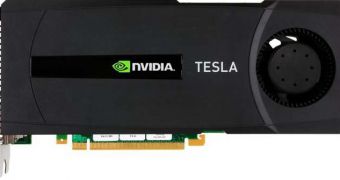Santa Clara, California-based NVIDIA, one of the world's leading vendors of high-performance graphics solutions, has recently revealed the specifications of its next-generation Tesla cards, designed for graphics professionals and business consumers. According to the specifications made available by the company, the new cards will be featured with a lower number of stream processors than what was expected for the GF100/Tesla T20 graphics processing unit (GPU). Apparently, the new Tesla cards will be featured with only 448 stream processors.
The chip maker is planning to release two new cards, the Tesla C2050 and C2070, which will feature a single-chip design with 3GB and 6GB of GDDR5 memory, respectively. The memory comes with a 384-bit interface and will work at frequency levels of 1.8GHz and 2GHz, with NVIDIA claiming that its new cards will be capable of delivering double precision performance in the range of 520GFlops to 630GFlops.
The series of Tesla C2000 graphics cards were previously believed to be featured with 512 Stream processors with clock speeds of between 1.25GHz to 1.4GHz, basically the full configuration of NVIDIA's much-anticipated, next-generation, Fermi-based GF100 chip. Based on the Tesla T20 graphics processing unit, the new cards will pair an 8-pin PCI-Express power connector with another 6-pin PCI Express connector, with a specified 225W TDP. By comparison, the company's current GeForce GTX 285, dual-GPU GTX 295 and Tesla C1050 have a maximum heat dissipation set at 204W, 289W and 187.8W, respectively.
The cards, according to available details, will retail starting the second quarter of 2010, with prices set at about US$2499 and US$3999, respectively. They are based on NVIDIA's next-generation GPU architecture, codenamed Fermi, which is said to deliver a number of features that have been built to enhance performance for both business and consumer applications. Fermi is also expected to get its commercial release soon, with the chip maker having some catching up to do, as ATI has already launched its next-generation cards.

 14 DAY TRIAL //
14 DAY TRIAL //